- Home
- F. Scott Fitzgerald
A Life in Letters Page 3
A Life in Letters Read online
Page 3
(F) General summing up.
(1) dress scrupulously neatly and then forget your personal appearance. Every stocking should be pulled up to the last wrinkle.
(2) Dont wear things like that fussy hat that aren’t becoming to you—At least buy no more. Take someone who knows with you—some one who really knows.
(3) Conform to your type no matter what looks well in the store
(4) Cultivate deliberate physical grace. You’ll never have it if you dont. I’ll discuss dancing in a latter letter.
(G) You see if you get any where and feel you look alright then there’s one worry over and one bolt shot for self-confidence—and the person you’re with, man, boy, woman, whether its Aunt Millie or Jack Allen o myself likes to feel that the person they’re sponsoring is at least externally a credit.
TO: Marie Hersey1
ALS, 1 p. Scrapbook. Princeton University
Princeton, New Jersey
Thurs
My Very Very Dear Marie:
I got your little note
For reasons very queer Marie
You’re mad at me I fear Marie
You made it very clear Marie
You cared not what you wrote
The letter that you sent Marie
Was niether swift nor fair
I hoped that you’d repent Marie
Before the start of Lent Marie
But Lent could not prevent Marie
From being debonaire
So write me what you will Marie
Altho’ I will it not
My love you can not kill Marie
And tho’ you treat me ill Marie
Believe me I am still Marie
Your fond admirer
Scott
(Letter sent to Marie Jan 29, 1915)
TO: Edmund Wilson
Fall 1917
ALS, 6 pp. Yale University
Cottage Club
Princeton, N.J.
Dear Bunny:
I’ve been intending to write you before but as you see I’ve had a change of scene and the nessesary travail there-off has stolen time.
Your poem came to John Biggs, my room mate, and we’ll put in the next number—however it was practically illegable so I’m sending you my copy (hazarded) which you’ll kindly correct and send back——
I’m here starting senior year and still waiting for my commission. I’ll send you the Litt. or no—you’ve subscribed haven’t you.
Saw your friend Larry Noyes in St. Paul and got beautifully stewed after a party he gave—He got beautifully full of canned wrath—I dont imagine we’d agree on much——
Do write John Bishop and tell him not to call his book “Green Fruit.”
Alec is an ensign. I’m enclosing you a clever letter from Townsend Martin1 which I wish you’d send back.
Princeton is stupid but Gauss + Gerrould2 are here. I’m taking naught but Philosophy + English—I told Gauss you’d sailed (I’d heard as much) but I’ll contradict the rumor.
The Litt is prosperous—Biggs + I do the prose——Creese and Keller (a junior who’ll be chairman) and I the poetry. However any contributions would be ect. ect.
Have you read Well’s “Boon; the mind of the race” (Doran—1916) Its marvellous! (Debutante expression. Young Benêt3 (at New Haven) is getting out a book of verse before Xmas that I fear will obscure John Peak’s. His subjects are less Precieuse + decadent. John is really an anachronism in this country at this time—people want ideas and not fabrics.
I’m rather bored here but I see Shane Leslie occassionally and read Wells and Rousseau. I read Mrs. Geroulds “British Novelists Limited4 + think she underestimates Wells but is right in putting Mckenzie at the head of his school. She seems to disregard Barry and Chesterton whom I should put even above Bennet or in fact anyone except Wells.5
Do you realize that Shaw is 61, Wells 51, Chesterton 41 Leslie 31 and I 21. (Too bad I havn’t a better man for 31. I can hear your addition to this remark).
Oh and that awful little Charlie Stuard (a sort of attenuated Super-Fruit) is still around (ex ’16—now 171/2). He belongs to a preceptorial where I am trying to demolish the Wordsworth legend—and contributes such elevating freshman-cultural generalities as “Why I’m suah that romantisism is only a cross-section of reality Dr. Murch.”
Yes—Jack Newlin is dead—killed in ambulance service. He was, potentially a great artist
Here is a poem I just had accepted by “Poet Lore”6
The Way of Purgation
A fathom deep in sleep I lie
With old desires, restrained before;
To clamor life-ward with a cry
As dark flies out the greying door.
And so in quest of creeds to share
I seek assertive day again;
But old monotony is there—
Long, long avenues of rain.
Oh might I rise again! Might I
Throw off the throbs of that old wine—
See the new morning mass the sky
With fairy towers, line on line—
Find each mirage in the high air
A symbol, not a dream again!
But old monotony is there—
Long, Long avenues of rain.
No—I have no more stuff of Johns—I ask but never recieve
I can go to Italy if I like as private secretary of a man (a priest)1 who is going as Cardinal Gibbons representative to discuss the war with the Pope (American Catholic point of view—which is most loyal—barring the SienFien—40% of Pershing’s army are Irish Catholics. Do write.
Gaelicly Yours
Scott Fitzgerald
I remind myself lately of Pendennis, Sentimental Tommy (who was not sentimental and whom Barry never understood) Michael Fane, Maurice Avery + Guy Hazelwood)2
TO: Mollie McQuillan Fitzgerald
ALS, 4 pp. Princeton University
Cottage Club stationery. Princeton, New Jersey
Nov 14th
1917
Dear Mother:
You were doubtless surprised to get my letter but I certainly was delighted to get my commission.
My pay started the day I signed the Oath of Allegiance and sent it back which was yesterday—Went up to Brooke’s Bros yesterday afternoon and ordered some of my equipment.
I havn’t received any orders yet but I think I will be ordered to Fort Lea van worth within a month—I’ll be there three months and would have six additional months training in France before I was ordered with my regiment to the trenches.
I get $141 dollars a month ($1700 a year) with a 10% increase when I’m in France.
My uniforms are going to cost quite a bit so if you havn’t sent me what you have of my own money please do so.
I’m continuing here going to classes until I get orders. I am a second Lieutenant in the regular infantry and not a reserve officer—I rank with a West Point graduate.
Things are stupid here—I hear from Marie and Catherine Tighe1 occasionally + got a letter from Non two weeks ago—I hear he’s been ordered to Texas.
Went down to see Ellen Stockton in Trenton the other night. She is a perfect beauty.
About the army please lets not have either tragedy or Heroics because they are equeally distastful to me. I went into this perfectly cold bloodedly and dont sympathize with the
“Give my son to country”
ect
ect
ect
or
“Hero stuff”
because I just went and purely for social reasons. If you want to pray, pray for my soul and not that I wont get killed—the last doesn’t seem to matter particularly and if you are a good Catholic the first ought to.
To a profound pessimist about life, being in danger is not depressing. I have never been more cheerful. Please be nice and respect my wishes
Love
Scott.
TO: Shane Leslie
ALS, 3 pp. Bruccoli
Dec 22nd, 1917
&n
bsp; My Dear Mr. Leslie:
Your letter followed me here—
My novel isn’t a novel in verse—it merly shifts rapidly from verse to prose—but its mostly in prose.
The reason I’ve abandoned my idea of a book of poems is that I’ve only about twenty poems and cant write any more in this atmosphere—while I can write prose so I’m sandwitching the poems between rheams of autobiography and fiction.
It makes a pot-pouri especially as there are pages in dialogue and in vers libre but it reads as logically for the times as most public utterances of the prim and prominent. It is a tremendously concieted affair. The title page looks (will look) like this
I’ll send you a chapter or two to look over if you would—Id like it a lot if you would.
I’m enclosing you a poem that “Poet Lore” a magazine of verse has just taken
Yours
F. Scott Fitzgerald
2nd Lt. U.S.
Co.Q P.O.Bn
Ft. Leavenworth
Kan.
TO: Edmund Wilson
1918
ALS, 4 pp. Yale University
Jan 10th, 1917.
Dear Bunny:
Your last refuge from the cool sophistries of the shattered world, is destroyed!—I have left Princeton. I am now Lieutenant F. Scott Fitzgerald of the 45th Infantry (regulars.) My present adress is
Co Q
P.O.B.
Ft. Leavenworth
Kan.
After Feb 26th
593 Summit Ave
St. Paul
Minnesota
will always find me forwarded
—So the short, swift chain of the Princeton intellectuals (Brooke’s clothes, clean ears and, withall, a lack of mental prigishness . . . . Whipple,1 Wilson, Bishop, Fitzgerald . . . . have passed along the path of the generation—leaving their shining crown apon the gloss and un worthiness of John Biggs head.
One of your poems I sent on to the Litt and I’ll send the other when I’ve read it again. I wonder if you ever got the Litt I sent you . . . . so I enclosed you two pictures, well give one to some poor motherless Poilu fairy who has no dream. This is smutty and forced but in an atmosphere of cabbage . . . .
John’s book came out in December and though I’ve written him rheams (Rhiems) of praise, I think he’s made poor use of his material. It is a thin Green Book.
Green Fruit (One man here remarked that he didn’t read it because Green Fruit always gave him a pain in the A——!)
by
John Peale Bishop
1st Lt. Inf. R.C.
Sherman French Co
Boston.
In section one (Souls and Fabrics) are Boudoir, The Nassau Inn and, of all things, Fillipo’s wife, a relic of his decadent sophmore days. Claudius and other documents in obscurity adorn this section.
Section two contains the Elspeth Poems—which I think are rotten. Section three is (Poems out of Jersey and Virginia) and has Cambell Hall, Mellville and much sacharine sentiment about how much white bodies pleased him and how, nevertheless he was about to take his turn with crushed brains (this slender thought done over in poem after poem). This is my confidential opinion, however; if he knew what a nut I considered him for leaving out Ganymede and Salem Water and Francis Thompson and Prayer and all the things that might have given some body to his work, he’d drop me from his writing list. The book closed with the dedication to Townsend Martin which is on the circular I enclose. I have seen no reviews of it yet.
* * *
The Romantic Egotist
by
F. Scott Fitzgerald
“. . . . The Best is over
You may complain and sigh
Oh Silly Lover. . . .”
Rupert Brooke
“Experience is the name Tubby gives to his mistakes . .
Oscar Wilde
Chas. Scribners Sons (Maybe!)
MCMXVIII
* * *
There are twenty three Chapters, all but five are written and it is in poetry, prose, vers libre and every mood of a tempermental temperature. It purports to be the picaresque ramble of one Stephen Palms from the San Francisco fire, thru School, Princeton to the end where at twenty one he writes his autobiography at the Princeton aviation school. It shows traces of Tarkington, Chesteron, Chambers Wells, Benson (Robert Hugh), Rupert Brooke1 and includes Compton-Mckenzie like love-affairs and three psychic adventures including one encounter with the devil in a harlots apartment.
It rather damns much of Princeton but its nothing to what it thinks of men and human nature in general. I can most nearly describe it by calling it a prose, modernistic Childe Harolde2 and really if Scribner takes it I know I’ll wake some morning and find that the debutantes have made me famous over night. I really believe that no one else could have written so searchingly the story of the youth of our generation. . .
In my right hand bunk sleeps the editor of Contemporary Verse (ex) Devereux Joseph, Harvard ’15 and a peach—on my left side is G. C. King a Harvard crazy man who is dramatizing “War and Peace”; but you see Im lucky in being well protected from the Philistines.
The Litt continues slowly but I havn’t recieved the December issue yet so I cant pronounce on the quality.
This insolent war has carried off Stuart Walcott in France, as you may know and really is beginning to irritate me—but the maudlin sentiment of most people is still the spear in my side. In everything except my romantic Chestertonian orthodoxy I still agree with the early Wells on human nature and the “no hope for Tono Bungay”1 theory.
God! How I miss my youth—thats only relative of course but already lines are beginning to coarsen in other people and thats the sure sign. I dont think you ever realized at Princeton the childlike simplicity that lay behind all my petty sophistication, selfishness and my lack of a real sense of honor. I’d be a wicked man if it wasn’t for that and now thats dissapearing. . .
Well I’m over stepping and boring you and using up my novel’s material so good bye. Do write and lets keep in touch if you like.
God Bless You
Celticly
F. Scott Fitzgerald
Bishop’s adress
Lieut. John Peale Bishop (He’s a 1st Lt.)
334th Infantry
Camp Taylor
Kentucky
TO: Shane Leslie
ALS, 1 p. Princeton University
Co. Q. P.O. Bn.
Ft. Leavenworth, Kan
Dear Mr. Leslie:
This is just a note to inform you that the first draft of the “Romantic Egotist,” will be ready for your inspection in three weeks altho’ I’m sending you a chapter called “The Devil” next week.
Think of a romantic egotist writing about himself in a cold barracks on Sunday afternoons. . . yet that is the way this novel has been scattered into shape—for it has no form to speak of.
Dr. Fay told me to send my picture that he wants through you. Whether he meant for you to forward it to him or put it away until he returns I didn’t comprehend.
I certainly appreciate your taking an interest in my book. . . By the way I join my regiment, the 45th Infantry, at Camp Taylor, Kentucky in three weeks.
Faithfully
F. Scott Fitzgerald
February 4th
1918
TO: Shane Leslie
February 1918
ALS, 1 p. Bruccoli
Fort Leavenworth, Kansas
Dear Mr. Leslie:
Here’s Chapter XVI “The Devil” and Chapter XIII. I picked it out as a Chapter you could read without knowing the story. I wish you’d look it over and see what you think of it. It’s semi-typical of the novel in its hastiness and scrubby style.
I have a weeks leave before joining my regiment and I’m going up to Princeton to rewrite. Now I can pass thru Washington and see you about this novel either on the seventh or eighth or ninth of February. Will you tell me which of these days you’d be liable to have an afternoon off. Any one of them are conv
einent as far as I’m concerned. I could bring you half a dozen chapters to look at and I’d like to know whether you think it would have any chance with Scribner.
The novel begins nowhere as most things do and ends with the war as all things do. Chapter XIII will seem incoherent out of its setting. Well—I leave here Monday the 26th. After that my address will be Cottage Club—Princeton, N.J.
I’d be much obliged if you’d let me know which afternoon would be most convenient for you
Faithfully,
F. Scott Fitzgerald
Did you ever notice that remarkable coincidence.——Bernard Shaw is 61 yrs old, H. G. Wells is 51, G. K. Chesterton 41, you’re 31 and I’m 21——All the great authors of the world in arithmetical progression
F.S.F.
TO: Shane Leslie
RTLS, 1 p. Bruccoli
45th Inf. Camp Gordon Ga.
May 8th 1918
Dear Mr. Leslie:
Your letter filled me with a variety of literary emotions. . . . You see yours is the first pronouncment of any kind that I’ve received apon my first born. . . . . . .
That it is crude, increditably dull in place is too true to be pleasant. . . . I have no idea why I hashed in all that monotonous drivel about childhood in the first part and would see it hacked out like an errant apendicitus without a murmer. . . . There are too many characters and too much local social system in the Princeton section. . . . . and in places all through the verses are too obviusly lugged in. . . . . .

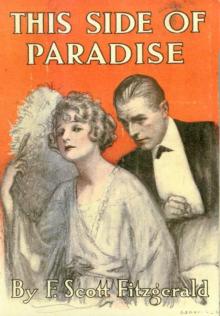 This Side of Paradise
This Side of Paradise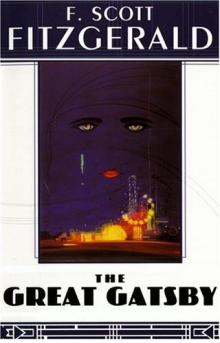 The Great Gatsby
The Great Gatsby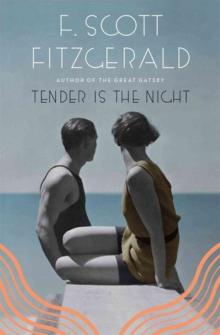 Tender Is the Night
Tender Is the Night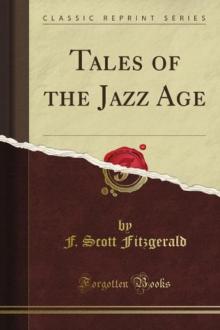 Tales of the Jazz Age (Classic Reprint)
Tales of the Jazz Age (Classic Reprint)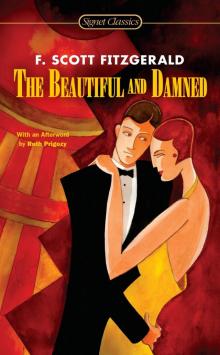 The Beautiful and Damned
The Beautiful and Damned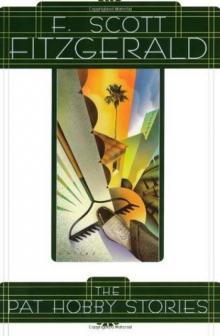 The Pat Hobby Stories
The Pat Hobby Stories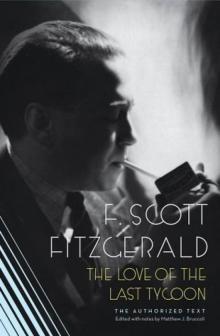 The Love of the Last Tycoon
The Love of the Last Tycoon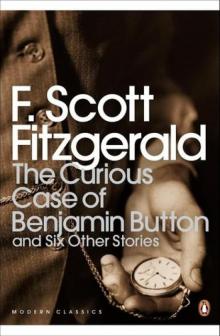 The Curious Case of Benjamin Button and Six Other Stories
The Curious Case of Benjamin Button and Six Other Stories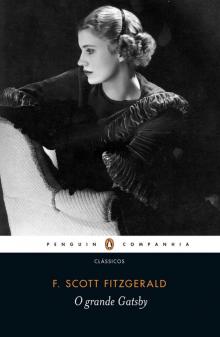 O Grande Gatsby (Penguin)
O Grande Gatsby (Penguin)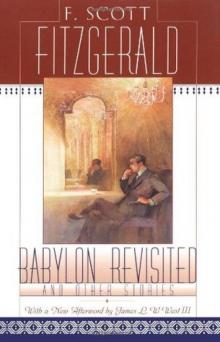 Babylon Revisited and Other Stories
Babylon Revisited and Other Stories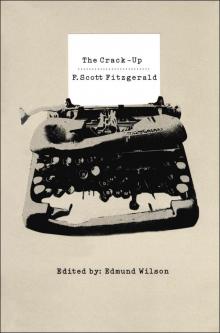 The Crack-Up
The Crack-Up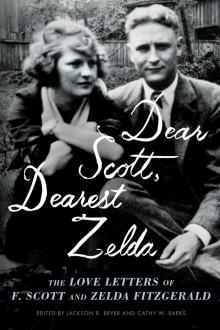 Dear Scott, Dearest Zelda
Dear Scott, Dearest Zelda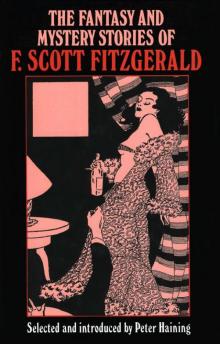 The Fantasy and Mystery Stories of F Scott Fitzgerald
The Fantasy and Mystery Stories of F Scott Fitzgerald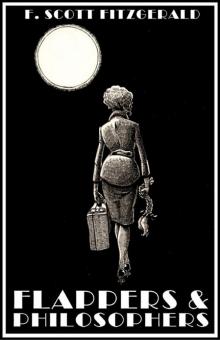 Flappers and Philosophers
Flappers and Philosophers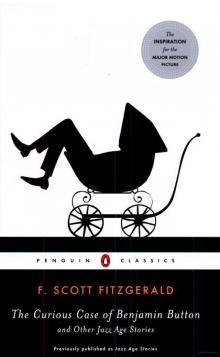 The Curious Case of Benjamin Button and Other Jazz Age Stories (Penguin Classics)
The Curious Case of Benjamin Button and Other Jazz Age Stories (Penguin Classics)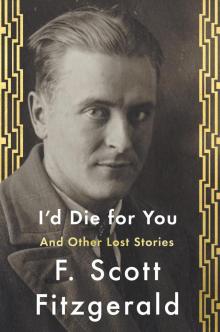 I'd Die For You
I'd Die For You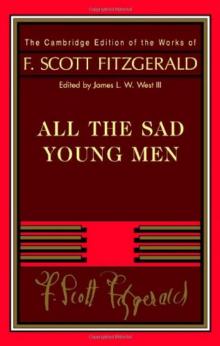 All the Sad Young Men
All the Sad Young Men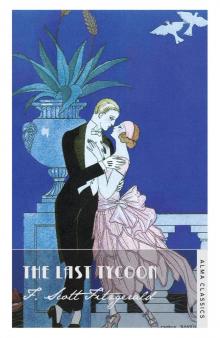 The Last Tycoon
The Last Tycoon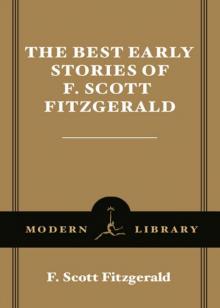 The Best Early Stories of F. Scott Fitzgerald
The Best Early Stories of F. Scott Fitzgerald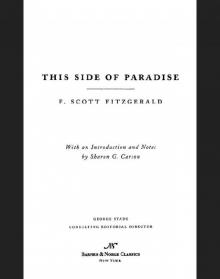 This Side of Paradise (Barnes & Noble Classics Series)
This Side of Paradise (Barnes & Noble Classics Series)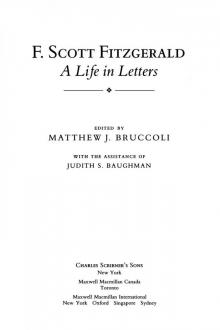 A Life in Letters
A Life in Letters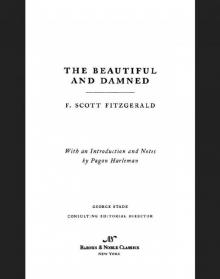 Beautiful and Damned (Barnes & Noble Classics Series)
Beautiful and Damned (Barnes & Noble Classics Series)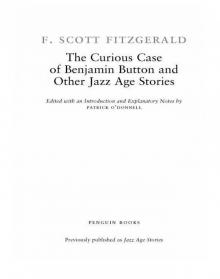 The Curious Case of Benjamin Button and Other Jazz Age Stories
The Curious Case of Benjamin Button and Other Jazz Age Stories Tales of the Jazz Age
Tales of the Jazz Age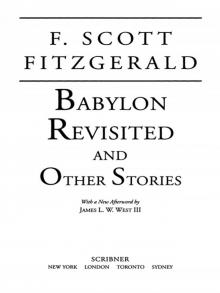 Babylon Revisited
Babylon Revisited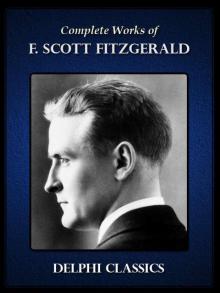 Complete Works of F. Scott Fitzgerald UK (Illustrated)
Complete Works of F. Scott Fitzgerald UK (Illustrated)